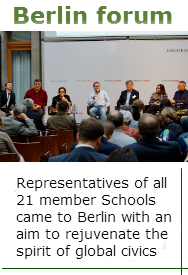Summer University for democracy
Schools of Political Studies
Closing statement by Terry Davis, Secretary General of the Council of Europe
Strasbourg, 10-14 July 2006
I hope you have done all your shopping because all the shops are closed today. France is celebrating its National Holiday, which marks the storming of a hated symbol of autocratic oppression - the Bastille prison in Paris – on 14 July 1789.
Anniversaries are bridges between our memory and the past. They allow us to remember, to reflect and to learn. The aftermath of the French revolution was marked by alternation between hope and frustration, enlightened progress and the horror of the guillotine. 14 July may be a French holiday, but the revolution has left its mark on the history of humankind. The first Article of the Declaration of the Rights of Man and of the Citizens reads: “All men are born and remain free and equal in rights…”. You will note that we have tried to extend this privilege to women for two hundred years.
In coming days, we will also commemorate the 70th anniversary of the beginning of the Spanish Civil War. This war will be forever remembered for the terrible fate of Guernica – a small town in the Basque country bombed by the Nazi Luftwaffe - and remembered also for the decades of repression which followed the victory of the Franco regime.
This, at least, is how civilised and enlightened Europe remembers these events. Some politicians have recently aired very different views – incidentally, they have done so in the building just across the river - but all they achieved was to provoke ridicule for themselves rather than seriously offend anyone else.
In November, we will also commemorate the brutal suppression of an attempt to transform communism into democratic socialism. I am referring to what happened in Budapest 50 years ago.
Mid-July is also the anniversary of another dark chapter in more recent European history. Eleven years ago, in Srebrenica, several thousand Europeans were brutally murdered by their fellow Europeans.
In less than six decades between Guernica and Srebrenica, Europe had both highs and lows. It was at the origin of a terrible world war, and it experienced the Holocaust. It rose from the ashes only to divide itself ideologically. At the same time, Europeans achieved reconciliation between people who had been enemies - on and off – for a hundred years and also began the most inspiring attempt at continent-wide unity and cooperation the world has ever seen, only to witness several new wars, perhaps smaller in scale, but certainly a match when it comes to brutality and wanton destruction.
There is a message in all that.
History is not a linear progression. It sometimes races ahead through spells of remarkable enlightenment and humanity, only to stumble, the very next moment, into terror, darkness and stupidity.
Freedom – in its broadest sense of being free of oppression, exclusion and discrimination – is immensely important and immensely vulnerable.
We may – and must – extend that freedom and reinforce our defences and safeguards, but we shall never achieve total immunity from threats to democracy and human rights.
Freedom may sometimes disappear abruptly. But more often, this happens slowly, over time, with freedom seeping away unnoticed at first, until it is late, sometimes too late to do something about it.
Our own freedom is defined by the freedoms of others. We may not be Roma, or Jewish, or Muslim or members of any other ethnic or religious minority. We may not be physically disabled, migrants or gays or lesbians, unemployed or on welfare or single mothers without resources, but if our fellow citizens who belong to these groups are not free, are not protected against discrimination and are not respected, we will be imprisoned with them. Freedom cannot be sliced up for personal consumption.
You are all here because of your commitment to defending and extending this freedom, and because of your determination to protect and promote democracy, extend human rights and defend the rule of law. I only hope that the time and effort you have invested in the Schools of Political Studies and your visit to Strasbourg for this Summer University will help and inspire you further.
Thank you very much.








